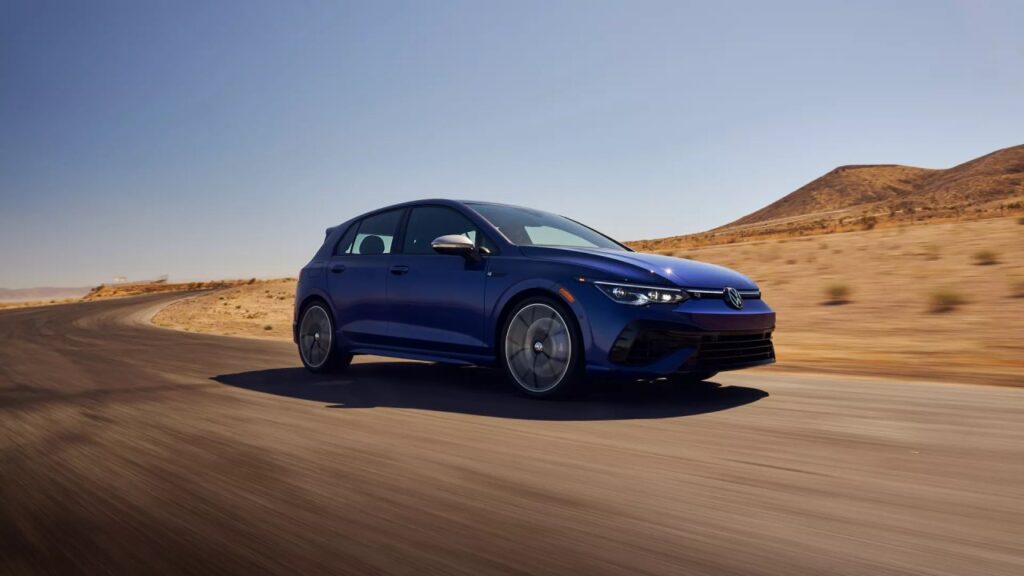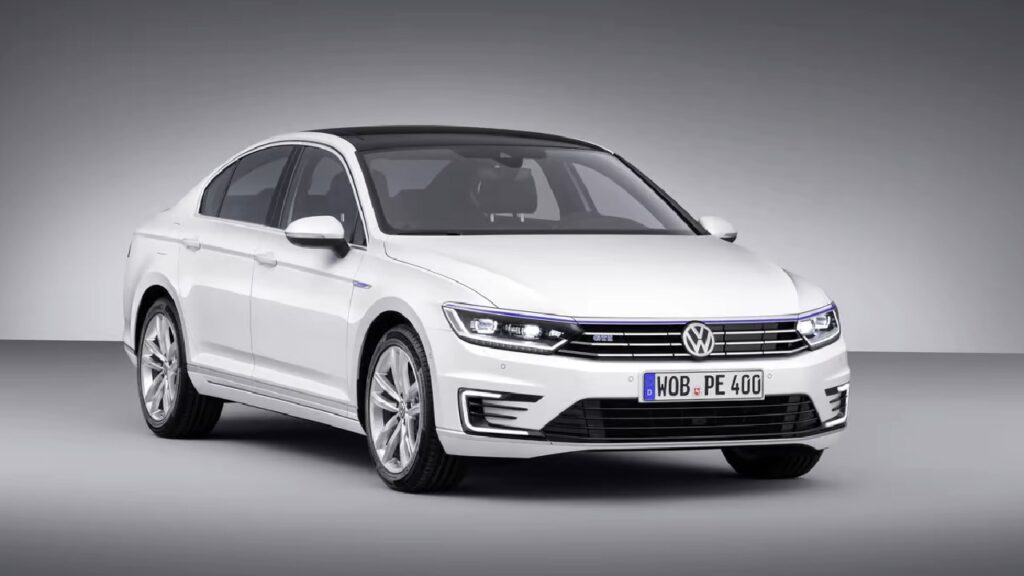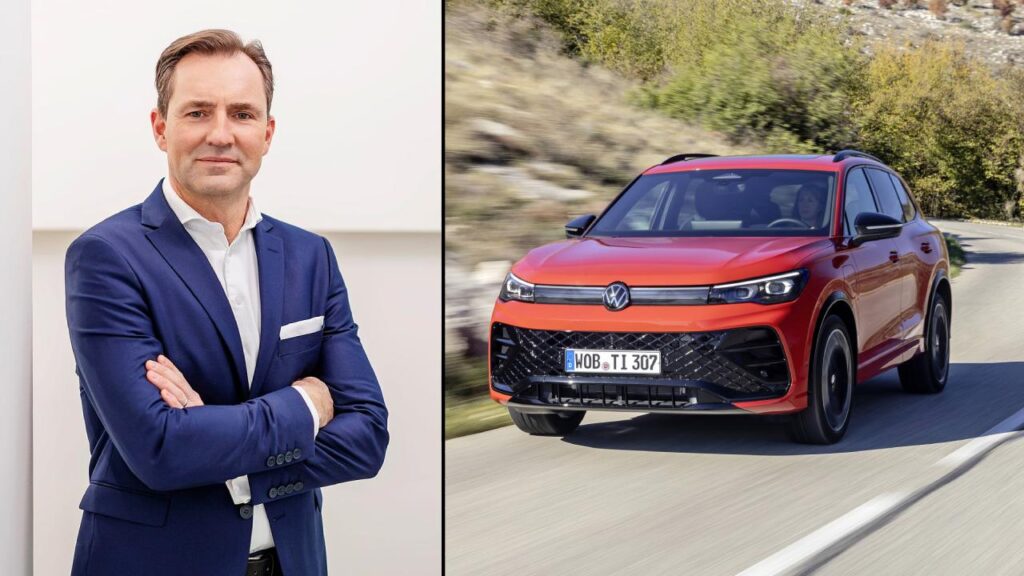It looks like increasingly more carmakers are having to delay their complete electrification plans to incorporate a transitional step in the journey of future mobility.
VW CEO, Thomas Schäfer, spoke at the Financial Times Future of the Car conference about PHEVs being the necessary transitional technology to reach the ultimate goal of electric mobility. With this, VW joins the expanding group of legacy car marques who are backtracking on their decision to skip hybrid cars to reach fully electric vehicles. At this conference, Nissan CEO Makoto Uchida and Hyundai President José Muñoz echoed the same strategy.

You might also like: CATL Unveils World’s First LFP Battery With a 1,000-km Range
PHEVs Are Transitional Technology
Volkswagen currently sells hybrid iterations of its popular Golf, Passat and Tiguan cars. Schäfer feels that PHEVs could continue to play a critical role in this transition phase from ICE cars to electric cars for a bit longer than previously anticipated. He also resonates with the latest reports of EV demand “plateauing”. He mentions that when VW was offering the aforementioned models in hybrid avatars, it was frowned upon.
But he says, “Now I’m very glad we did. We have an offer and we will probably have to even extend it. It’s a bridge technology. While battery-electric drive is plateauing out a bit at the moment, we still need this transitional technology.” I must mention here that the VW CEO is not backing out of the EV plans as he is “absolutely sure the future is electric”. Furthermore, he confirms that VW will carry on with what it has and will not build a completely new powertrain.
Finally, he also elucidates that VW won’t necessarily have a hybrid variant of every model it sells in every part of the world. Instead, the German auto giant will focus on reducing the costs of hybrids while boosting the pure electric range to offer something meaningful to the customers. These two are the top concerns among potential buyers at the moment. Remember, VW hybrid cars are already ahead of most carmakers with a pure electric driving range in the vicinity of 62 miles (100 km). Boosting this range further could be exactly what the buyers are looking for.

You might also like: Ford Will Have Hybrids In Every Segment – Ford CEO Jim Farley
Learn Electric Cars Says
The debate of whether or not hybrids still have a significant future has been brewing for a while now. While many wrote off hybrids as the technology of the past, the recent slowdown in EV sales across major global markets has reignited interest in hybrid cars today. While I am almost fully convinced that the future of mobility is electric, I don’t think that it will arrive as soon as people are anticipating.
There are still numerous challenges prevailing around mass EV adoption including range anxiety, charging times, charging infrastructure, material sourcing for batteries, battery recycling, etc. Not to mention, even the governments are slowly reducing incentives to buy electric cars. Hence, it won’t be an easy, brisk or smooth transition. I am of the opinion that hybrid cars are here to stay for the foreseeable future to reduce friction while transitioning from ICE cars to EVs.


Pingback: VW Confirms An Affordable €20,000 Entry-Level EV For 2027
Pingback: 94% Of All New Cars Sold In Norway In August Were Electric
Pingback: Trustbet เว็บพนันออนไลน์ ลิขสิทธิ์แท้เว็บตรง
Pingback: LSM99 แทงบอลออนไลน์ ราคาดีที่สุด
Pingback: Buy Daniel Defense Soundguard™ DT Suppressor Adapters Online
Pingback: stiiizy edible
Pingback: https://vhnbio.com
Pingback: special info
Pingback: วิธีซื้อหวย Magnum 4D กับเว็บ LSM99
Pingback: หัวมาโบ
Pingback: Biald Alrafidain University
Pingback: แทงบอลสด ฝาก ทรูวอเลท ไม่มีขั้นต่ำ
Pingback: เว็บ 789 มีแค่สล็อตทดลอง แต่ Lsm99 ให้มากกว่า
Pingback: chat with naked girls
Pingback: bangkok tattoo
Pingback: เสื้อช็อป
Pingback: lost mary bm3500
Pingback: ufa168
Pingback: โคมไฟ
Pingback: ของเล่นสนาม
Pingback: ปั้มไลค์
Pingback: Mostbet casino
Pingback: ufa789
Pingback: FORTUNE DRAGON
Pingback: สร้างรายได้จาก YouTuber
Pingback: รวยพันล้าน เว็บหวยอัตราจ่ายสูง
Pingback: lsm99 love เว็บเกมดังระดับโลก
Pingback: processor for gaming hyderabad
Pingback: clothing manufacturer
Pingback: บาคาร่าเกาหลี
Pingback: av
Pingback: เว็บปั้มไลค์
Pingback: buy followers instagram
Pingback: thailand bus ticket
Pingback: พลาสติกปูพื้นก่อนเทคอนกรีต
Pingback: bianco carrara
Pingback: สั่งของจากจีน
Pingback: สั่งของจากจีน
Pingback: เน็ต บ้าน ais
Pingback: หนังสั้น
Pingback: Zexpire
Pingback: blazing crown deluxe
Pingback: Villa for sale in phuket
Pingback: pilates instructor woodland hills
Pingback: โบลเวอร์ kruger
Pingback: kruger
Pingback: บาคาร่าเกาหลี